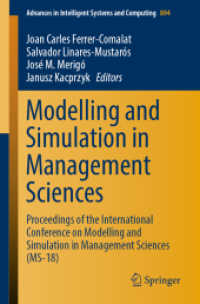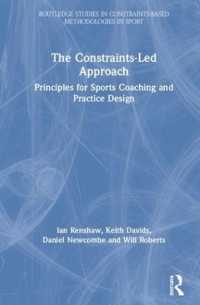- ホーム
- > 洋書
- > 英文書
- > Business / Economics
Full Description
This insightful Research Handbook examines the role of Information Systems & Technology (IS&T) across multiple fields including artificial intelligence, cloud computing, business intelligence and mobile communication. It discusses the ethical implications of IS&T, including risks to privacy and security, and outlines potential solutions to these challenges.
Contributing authors illustrate the complex and rapidly evolving state of the field, analysing case studies that demonstrate the transformative impact of technology on global business organizations. They provide insight into the design and usage of information systems, rethinking current paradigms around the development of smart technologies, automated computations and digital transformations for industrial applications. This Research Handbook showcases how information systems can be used to advance intelligence systems, smart drones and configured chatbots, while examining the impact of blended learning platforms on online learning during the COVID-19 pandemic.
The Research Handbook on Information Systems and Technology is an essential guide for students and scholars in science and technology, IS and sociology. Its practical approach to a diverse range of industries will also greatly benefit practitioners and researchers in knowledge management, technology design and innovation.
Contents
Contents
Introduction to the Research Handbook on Information Systems and Technology ix
Arti Jain, John Wang and Arun Kumar Yadav
1 From prompt to production: a design process pipeline using AI 1
Gerry Derksen
2 Paradigm shift in the role of information systems for teaching pedagogy 15
Arti Jain, Ekta Srivastava and Shruti Goyal
3 Advanced IoT-based pest management system for smart agriculture using
hierarchical multiscale LSTM with Attention Mechanism 35
Paramita Sarkar, Debmitra Ghosh and Dharmpal Singh
4 Factors affecting cloud computing adoption: a case study of Australian
businesses 66
Satha Pillay, Uwe Kaufmann and Kavita Goel
5 Comparative analysis of farmers' producer organizations' Fourth Industrial
Revolution Technology adoption in Karnataka and Assam region 85
C. Ganeshkumar, Nitish K. Singh and B. Venugopal
6 Online learning during COVID-19: focus on students' perspective,
accessibility, and geographical location 102
Sreerakuvandana and Riya Rafeekh
7 Revolutionizing STEM learning with automated artificial intelligencebased tools 122
Shaziya Banu S., Sreerakuvandana, Shivi Sharma and Rakshith
Krishna
8 AI-based air quality monitoring and prediction information system 137
Divya Rishi Sahu, Deepak Singh Tomar, Rajeev Kumar Gupta, Harsh
Tiwari and Mohit Kumar
9 Sculpting Success: How Information Systems Reshape the Art and Science
of Marketing 157
S. S. Aravinth, M. Ravisankar, Ayodeji Olalekan Salau and K. Selvam
10 Digital technologies: empowering sustainable development, conquering
societal changes 174
Janmejai Kumar Shah, Manu Sharma, Sudhanshu Joshi, Abhishek
Mishra and Rajat Sharma
11 Information systems in HR processes: perspectives and processes 184
Kavita Ajay Joshi and Santoshi Sengupta
12 Constraints to the adoption of blended learning in higher education
institutions in an emerging market context: the case of Uganda 203
Issac Wasswa Katono and Stephen Kyakulumbye
13 Integrating machine learning and deep learning into healthcare
information systems: concepts, techniques, and comparative insights 226
Mohit Kumar and Archana Purwar






